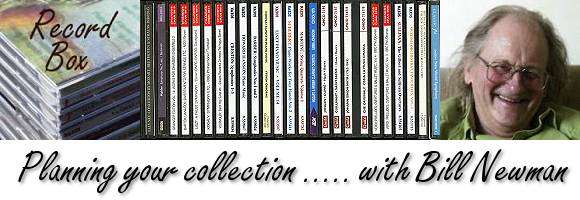
A new series for the CD collectorPart I - Global fascinations and sophisticationsIn the course of amassing an enormous record collection over nearly 55 years - I am not just one lone, crazy guy with this particular obsession - and meeting up with others of similar persuasions, my opinions grew into sharp focus, constantly expressed to knowing colleagues on given occasions. I dislike 'hype' in any shape and form, regarding it as a deterrent to knowledge and good taste. Its original intentions were to bring music's message into the domain of the mass population, but what has happened on the live scene? In jolly old England, music written roughly between the death of Elgar and the emergence of Tippett and Britten (excepting Holst and Vaughan Williams) has been side-stepped into a back seat position, any larger sense of British traditional values lost in the process, replaced by an urge to go forward in preparation for the new millennium with its top promotion of a current generation's up-and-coming composers. Fine, for young audiences or fiercely eclectic older supporters who go literally into ectasies following premières by Maxwell Davies, Birtwistle, Turnage, MacMillan, Adès, but what think composers, pray, who write from a more conventional, communicative standpoint like Maw and McCabe? Light music is also one of the genres affected - the obvious exception the music of Eric Coates. Conversant with the BBC's unstinted support of new music and commissions alongside more standard fare, somewhile back I unwisely tackled Piers Burton Page - the occasion a function celebrating Sir Malcolm Arnold's 70th Birthday by the Worshipful Company of Musicians - on why Matinées Musicales had suddenly been removed from the Radio 3 network. His answer: 'It's outstayed it's welcome; it had to go!' left me with a nasty taste in my mouth, especially knowing that a revival of interest was underway and that record companies were bound to react strongly in favour of a musical public who wouldn't let go once their appetites were aroused. The BBC still remains unmoved, and what happens in this direction either on Radio 1 or 2 is just a pale reflection of what we enjoyed and learnt from series of planned programmes in bygone years. Hype, applied to the performing artist is even more complex. International competitions and critical reaction have brought about a highly selective choice of contestants thrust onto the circuit in a very big way. A spate of young, and older talent are left to fend for themselves, sometimes with the help of artist management content to risk their knowing they will only half fill the hall, although there are excellent organizations like YCAT who do remarkable work to build promising youngster's reputations from the word go. More often, there are artists who cannot obtain further bookings unless they have already appeared at one of the major locations. Martino Tirimo (placing creativity above publicity) at half-way point in his cycle of Beethoven Sonatas at St. John's, Smith Square, London gave a performance of the Appassionata that had me delving back 30 years to compare with Brendel at the Queen Elizabeth Hall. I looked round at the empty seats without recognizing a single critic in attendance, wondering what was the purpose of the exercise. Proof lies in the fact that some audiences don't know the repertoire, either - the deservedly popular, distinguished Murray Perahia started a Bach programme with Brandenburg Concerto No 1, and without any prompting the whole mass audience applauded at the close of the first movement, the announcer Susan Sharpe coyly suggesting that 'some were taken by surprise'. Really! I can forgive fans of Maxim Vengerov at London's Barbican not knowing his fast-moving encore piece - Shchedrin's Mandolin - but the sudden clapping that broke out followed by laughter right on the point of key change (where a pause occurs) made it obvious that they had little idea that the music should resolve in the tonic. 'What has this preamble to do with "Planning YOUR Collection"?' You may protest, but this music business has to be put in perspective. Record companies worldwide, alarmed at the sales slump in top repertoire favourites, have accepted the challenge by widening musical choice, going back in years to remind listeners of past glories while allowing much greater freedom in choice of artists, overall. Performers of yesteryears can now be compared with succeeding generations in proliferation, yet obtaining the best version of music that delights you most should ultimately be your decision. Critical comments are generally constructively helpful, but each and everyones' emotional acceptance of the near-ideal performance will still differ widely. Copyright © 21 June 2000 Bill Newman, Edgware, UK
|
